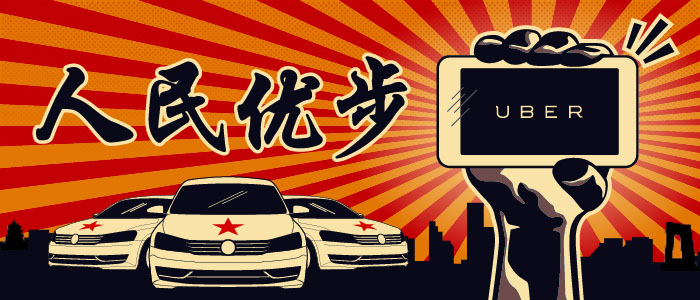优步的人民 The People of Uber: Driver Stories
作者:题记
这篇文章的主人公是为”人民优步“平台服务的司机们。“人民优步”是Uber原有的豪华轿车和优选轿车服务的自然延伸,也是来自用户群体的请求的结果。在这篇文章中,我们记述了人民优步最早一批司机中的几个故事。他们加入的原因有很多种,有人想开车、有人相交朋友、有人想为了自己方便、有人想为了环境着想。他们都是我们身边的人,他们都是优步的人民。
老柴
老柴出生于1956年。他年轻的时候最大的丰功伟绩就是在21岁的时候拿了全乡拖拉机大赛的第一名。从此他的一生与车结缘。在那个年代,如果说一个农村的年轻人是开拖拉机高手,那就像今天的年轻人说自己是赛车手一样,是最“酷”的一种标志,据老柴回忆说,这件事给他的人生带来了两个变化。第一,他的妻子是这样认识他并且被他吸引的;第二,他从此成为了生产队的司机,因此他负责驾驶生产队唯一的一辆卡车。
这辆卡车改变了全家人的命运,改革开放后,在相对宽松的政策环境下,他率先开始跑运输。老柴有四个孩子,他用这辆卡车供着四个孩子全部走出了甘肃的山村,去到了北京、香港、加拿大。如今,儿女把他接到了北京,他一切都喜欢,唯独开不了车,让他总是心痒痒的。身在偌大的北京,却只能待在家里看电视,而老伴除了跳广场舞,基本不出门。
今年年初,老柴得到了一辆长安小轿车作为儿女们给他的礼物,他终于高兴了起来。现在,他最经常进行的活动是接送邻居买菜,并且因此认识了小区里的很多街坊。
自从从事IT服务业工作的侄儿给老柴介绍了Uber,他也跃跃欲试,在古稀之年接触智能手机软件,老柴正在成为一名最“潮”的老司机之一。
张磊
张磊大学毕业那年,北京市开始机动车购买摇号,而他一直遭受不幸。
张磊家在五道口,但是这几年来一直在国贸附近上班,他一直摇不到号,为此苦不堪言。几年以来,他想过各种各样的办法,要不就是在地铁中早晚高峰挤到近乎晕厥,要不就是顺路同事带他上班,但毕竟同事不是每天都有,而且还会不时遇到限号困扰。
这种情况一直持续到去年。在他终于买到了车时,他想的第一件事就是,上班拼车,解救那些和他一样的朋友,而邻居们都对他感激涕零。
玩笑归玩笑,张磊拼车有着更深层次的原因。他给我们算了一笔账: “如果是原本每人一辆车的话,拼车后一辆私家车可以乘坐5人,可以减少4辆车的出行,这减少的汽车尾气排放量可是不小的。”
为了达到这个目的,不光他自己需要来拼车接在别人,他还需要说服成千上万的人也来拿出自己的车,和朋友们来共享。现在,有了Uber的平台,这项行动的效率终于提高了不少。
峰哥
峰哥是典型的北京土著,他还说自己和某位摇滚明星是发小。在他们长大的那个时候,正阳门的城楼是开放的,外面也没有公路,他们经常爬上去放风筝。成年以后的峰哥开车又经过这些地方的时候,总有一种“阳光灿烂的日子”里的感觉。
他多年以前在秀水街做生意,在北京攒钱买房,并给一些外商当过职业司机,随后,他就进入了半退休的状态。他也在优步的平台开车,开的是租赁公司的奥迪。不过据他说,开公司车和开自己车感觉并不太一样。
“我在北京出生长大,几十年来一直生活在这里。我最喜欢的事情就是开着车在城里来回溜达。对很多人来说,这些地方就是旅游景点,但对我来说这个东西是不一样的。到现在为止,我最喜欢的事情还是没事儿就开车出去逛逛,如果有朋友的话,带着人家游览北京,然后回家吃爱人烧的菜,再喝点小酒。
怎么讲呢,开公司的车的时候,感觉是在作为职业司机在给客户提供服务,平时的话,更休闲一些,而且开自己的车心里非常舒坦,对待顾客更像是朋友。”
后记
属于最广大的人们的交通服务、所有权的模糊,这种近似于大同社会的美好愿景,如今因为科技,正在以另一种方式回归。我们正在经历一个全新的商业时代,如今的消费者正在投入分享型企业的怀抱,来获取他们想要的产品和服务。
资源分享,不仅仅是在经济层面上的革新,更是一种文化突破,这种突破,是通过一套具有复杂机制,算法,以及精细的奖惩系统实现的。Uber的平台正因为具有了这一点,因此打,成为了资源分享的模式中缺少的最后一块拼图。
最重要的是,这种人对人的平台,鼓励我们要相信我们的人类同胞。
The People of Uber: Driver Stories
As we roll out People’s Uber to the streets of Beijing, we wanted to share some of the driver stories that have inspired us at Uber Beijing. People’s Uber is a natural extension of Uber’s popular BLACK and X services, at the request of many riders and drivers in Beijing. The following vignettes capture some of the motivations, personalities, and values of early drivers on People’s Uber.
Uncle Chai
Uncle Chai was born in 1956, and quickly became a local hero by winning the regional tractor contest at 21. As the equivalent of a modern racecar champion, he went on to live a life of driving. Uncle Chai recollects two major changes in his life: it brought him a beautiful and loving wife, and he became the driver of the single local tractor in his village.
This tractor changed the fate of his family, and after the reform, began his career in transportation service. Chai has four children, and through the labors of his tractor, provided them a carefree childhood in Gansu Province as well as the opportunity to move to Beijing, Hong Kong, and Canada. A couple years ago, he moved to Beijing to be closer to his grandchildren, and everything is right – except one thing: he misses driving. He knows Beijing has so much to offer, but he doesn’t have many friends, and couldn’t possibly keep bothering his busy children for company. So while his wife is out Square Dancing in the park, he slowly has taken root in front of the TV, waiting for the family to come home.
Earlier this year, Chai received a Chang’An sedan as a gift from his children, that lifted his spirits! He’s regained his past ‘celebrity status’ as the neighborhood driver, sharing rides around town and befriending other residents in the area.
Through his tech-savvy nephew, Uncle Chai learned about Uber, and is eager to expand his network beyond his neighborhood. Soon he will be the hippest grandpa in town.
Johnny
The year Johnny graduated from college, Beijing had just started the car plate lottery system, a lottery in which he unfortunately had no luck with. He continued living in the university area of Wudaokou after graduation to keep his apartment and social circle, but his work brought him across town to Guomao/CBD every day. When schedules and routes aligned, he would be able to hop into a friend’s car to carpool to work; however, most of the time either his friend’s plate would be restricted or the timing wouldn’t match, and Johnny would have to squeeze onto the subway to and from work.
This continued until last year, when Johnny’s luck changed and he got hit the car plate lottery, giving him the chance to purchase a car. He can’t wait to repay some of the favors to the friends who shared innumerable rides with him over the years. With People’s Uber, Johnny looks forward to splitting some of the costs of owning and driving his car, as well as helping out old friends and new that, like him just a year ago, haven’t been able to buy their own car!
Brother Feng
Brother Feng was born and raised in Beijing – growing up along the Forbidden City’s Qianmen when it was still open to the public with no roads out in front, perfect for a couple boys to monkey up to the rooftops to fly kites. To this day, Feng feels a warm rush of nostalgia every time he passes through it, amongst all the new roads and buildings.
After a couple years as a merchant at the Silk Market, Feng learned some English and saved up enough to buy a car, then started driving for international clients while roaming his beloved streets of Beijing. When he heard about Uber, he joined a rental car company for a steadier stream of business – but for him, driving a company car is just not the same as driving his own.
“I was born and raised in Beijing, this is the life I know. My favorite thing to do is to roam the streets and explore my city. For a lot of people, these places are ephemeral tourist attractions, photos in their smartphone – but for me it’s different. I love to hop in the car and drive, if there’s a friend to bring along or show the city to, even better. And I cap it off with some good food and a bit of wine, that’s the Beijing life.
Frankly, driving a company car feels makes me feel restricted, and distanced from the rider. The great thing about being a driver is when you can feel completely relaxed, ready to go where the roads or fellow riders take me. Driving my own car, I can feel like a welcoming host to my guests.”
Final Thoughts
Through these drivers’ stories, we see that the backgrounds, motivations, and circumstances for every driver are different. One thing they all have in common, however, is that like you and me, they are people of Beijing and can be both drivers and riders through People’s Uber.
As individual ownership turns into sharing rides and increasing the efficiency of resources, it feels like the way the future should be. We are on the cusp of a new era, where consumers are venturing into the sharing economy, and finding efficiency and choice for the products and services they love. This change will be powered by technology, but will be carried forward by everyday people like Uncle Chai, Johnny, and Brother Feng – all pushing for a better life.
